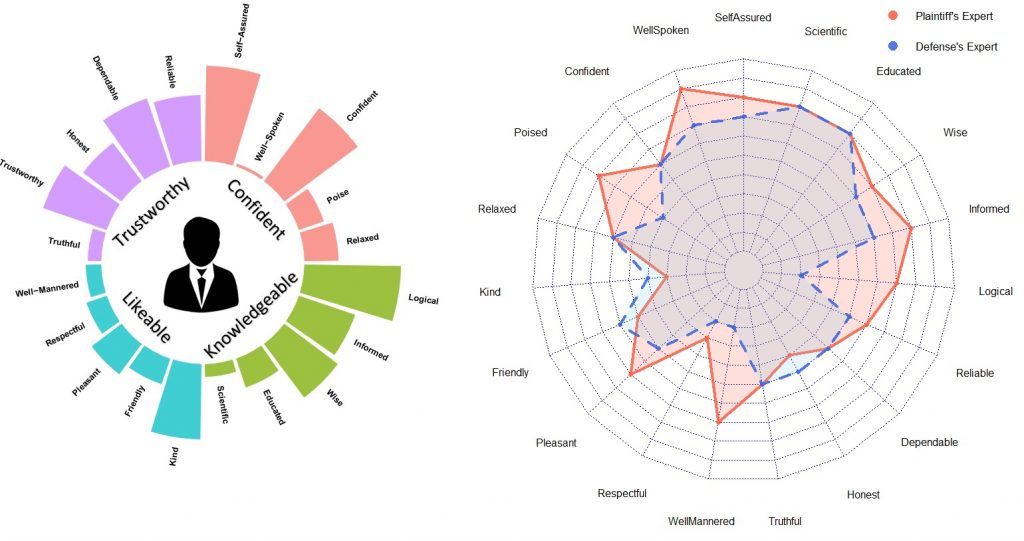
Persuasion is key in court cases and one of the best tools to persuade the jury is an expert witness. Witnesses are brought in for trials as tools to strengthen your claims and overall case through their expert testimony. Experts have advanced knowledge on specific topics and the ability to explain difficult concepts to help educate and persuade the jurors. However, persuasiveness is only as strong as the credibility of the source. The less credible the expert witness seems, the less their ability to educate the jurors and thus to persuade them in the way you had planned. Many times, there are opposing experts that have dissenting opinions to that of your expert. This makes measuring the credibility of both your expert witness and the opposition’s expert witness a very important step. The most believable and credible expert will give their side the edge. You, as a Plaintiff’s attorney, may review experts’ backgrounds, previous testimony, and credentials when assessing whether or not to use them in your case. However, in the end, your personal view of the expert matters very little. Your job is to simply make sure that they meet all the requirements to be used as an expert in court and that they have a strong track record. The only view of the experts that really matter is that of the jury. Attorneys have a good idea of what a judge would deem an expert and the criteria they must meet to be used as an expert in a court case, but most attorneys have little understanding of whether or not those expert witnesses are viewed as credible by the people who make the actual case decision, the jury.
What Makes Your Witness Credible to Jurors?
![]()
There have been mass amounts of research on this topic with very little agreement among researchers and attorneys. Recent research has had promising results and concluded that jurors view expert witnesses in a far different way than previously thought. Like judges and attorneys, jurors care about how the expert’s education and credentials look on paper. However, the jurors also take into consideration the collective observed assessment of the expert witness when discussing the case in deliberation. This collective observed assessment can differ drastically from that of attorneys. Jurors care about the content of the expert’s testimony, but also the way the expert speaks, reacts, and portrays themselves. They focus on source factors, which are simply the aspects that the source of information possesses. There are four main source factors that jurors base their judgments on regarding expert witness credibility and they are knowledge, trustworthiness, confidence, and likability.
Knowledge
This is likely the most obvious and expected factor of the four listed. Though you get an idea of the knowledge of an expert witness through their education, experience, and certifications, observed knowledge differs from that of on-paper credentials. Knowledge in this context refers to the expert witness’ ability to effectively explain the content they are discussing. From the view of a juror, they must be able to comprehend what the witnesses are discussing and view the expert’s explanation as plausible based on their limited understanding of the topic. Using many difficult terms and jargon will not increase their perceived knowledge or credibility of the witness and may actually have a negative effect. It is important for witnesses to be able to effectively explain the topic as if they were speaking to a layman, which is what makes up the majority of juries. The use of visual aids and non-verbal communications such as hand gestures can greatly increase the jurors’ views of the expert’s knowledge of the topic. Using jargon but then thoroughly explaining the concept can help remedy the negative effect that large amounts of jargon can have on a jury’s perception of the expert witness’ knowledge.
Trustworthiness
Perceived trustworthiness is of great importance because it can supersede the other three factors listed. This means that if the perceived trustworthiness of an expert witness is low, the view of the other three factors will be diminished and likely be insignificant. Even if you have the most notable expert from the most prestigious school, if they are unable to portray themselves as trustworthy, they will undoubtedly be deemed a poor expert and negatively affect your case. It is important, again, to view this factor as perceived, meaning it is an observed factor. The expert you hire can have a spotless record and reputation with no signs of any deception or troubles, but the jury can still perceive them as untrustworthy. Trustworthiness in this context refers to an expert’s ability to portray themselves as intelligent and confident as well as being able to efficiently explain the material they are discussing in a way that makes it seem believable. Some verbal, non-verbal, and linguistic problems can portray a lack of trustworthiness, such as demeaning answers, laughing at questions, and signs of worry or distress.
Confidence
Confidence is likely to be a factor that you expect an expert to portray. When someone is deemed an expert, they should be able to confidently answer questions with their expert opinions without pausing or second-guessing their answers. Perceived confidence involves an expert witness effectively discussing a topic, quickly and efficiently replying to questions, and staying on topic. It is important for an expert witness to be able to answer their questions without going back to notes or taking a break, either of these things portrays the expert as being unsure of the answer or afraid their answer may be “wrong” or not what the hiring party wants to hear. There are verbal, nonverbal, and linguistic variables that can portray an expert as lacking confidence. Some examples of these are repetitively pausing, saying exclamations such as “um” and “uh”, showing signs of distress or worry, and physically moving or fidgeting.
Likability
Though often ignored by attorneys, likability is a very salient factor in the eyes of the jury. The likability of a witness is assessed by the jurors observing the witness’ behavior during either deposition or in-trial testimony. One would think the likability of a witness mattered less than the other variables, however, it has been found to have as strong, or stronger, of an effect on perceptions of credibility as the other three listed factors. Likability involves the degree to which a juror views them as agreeable, respectful, or pleasant. Though agreeableness is correlated with likability, witnesses are able to disagree with dissenting opinions but need to do this in a pleasant and respectful way. Honesty also plays a role in this component, hence the reason it heavily affects the perceived credibility of the witness. An example of verbal, nonverbal, and linguistic cues that affect likability are emotional stability, clear and efficient descriptions of the topic, enthusiasm, explanatory hand gestures, and eye contact. It is important for your expert to seem like they are really wanting to help the case and are being honest doing so. Likability can be the differentiating factor in whether or not a jury believes your expert or the defense’s expert.
What Can Be Done to Get the Best Experts?

You pay a lot of money to experts in hopes they can be beneficial to your case by persuading jurors with their expert opinions and descriptions of complex topics. However, their expert opinion and testimony are only as strong as a jury’s perception of them. As stated earlier, the information is only as credible as its source. You can spend hours evaluating specific types of experts or pay a company to get one for you, but in the end, neither you nor the company you hire knows how jurors will view that expert.
We at Jury Analyst can take short highlighted clips of both your witnesses and those of the defense and test them with real potential jurors from your area. We are able to evaluate jurors’ perceptions of their credentials, how they portrayed themselves in the video, and the overall effectiveness of their testimony. You will be able to gain an in-depth look at your expert from the eyes of the juror, which can be game-changing for the jury selection and outcomes of your case. With the information we provide, you can find the weak points in your expert’s testimony, whether it be their confidence, fidgeting, overuse of jargon, or any other problem. This information can also be useful for the defense’s witness. You can find their weak points and discover how real potential jurors view them compared to your expert. If you are going to spend thousands of dollars on an expert, you should not be simply looking at their resumes or trusting their hiring company. You should be taking an in-depth look at what really matters, how jurors view that individual, and whether or not they will be able to benefit your case with their testimony effectively.
